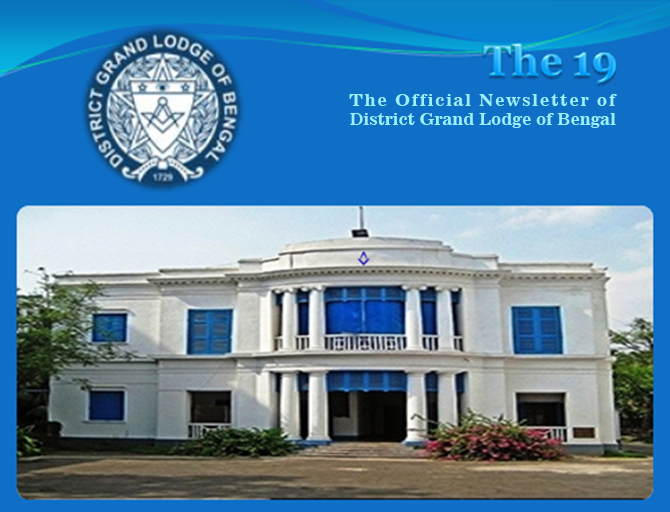
VOL - I
MAY 2021
ISSUE - 12
FROM THE EDITOR’S DESK
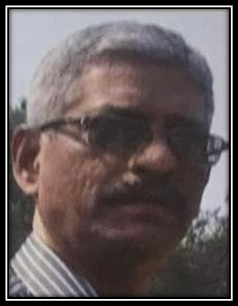
Brethren, yet another dear brother gone. Victim to the dreaded virus. Managing the affairs of the Bhowanipur cemetery, Bro Michael Bose’s calling had long prepared him “by contemplation, for the closing hour of existence”. Having seen it at such proximity all these years, he had lived every moment of his terrestrial sojourn by the creed, “death has no terrors equal to the stain of falsehood and dishonour.” Where else can he now be but in the eminently-merited good graces of the Most High. Bro Nauzer Batlivala calls to mind, “A brother for all reasons, a brother for all seasons. Michael Rene Bose fit this description to a T. A dedicated Mason, especially to his mother Lodge and Chapter Darius, being both PM and PZ, he was called to the Grand Lodge Above on 2nd May, a black day for the brethren and companions of Darius and for the DGL of Bengal to boot. A behind the scenes worker, humble and sincere, ever ready to put the interest of the Lodge ever so often before his own with a smile on his face. A brother who will be sorely missed by all who knew him within the Lodge and without. Rest in everlasting peace, dear Brother Michael. May the GAOTU keep you by His side always.”
Talking of obituaries, scarcely an issue has passed in these twelve months of its existence – a year that we shall reminisce on presently — that The 19 has not commenced with a mention. Mason after ill-fated Mason. Dear ones, one as young as in her early twenties, cruelly, untimely snatched from devastated kin. And this, not to mention the brethren fallen prey to the cataclysmic pathogen, their number legion. Will Zhongnanhai answer? If crossed fingers can ward off further catastrophe, may they remain ever so entwined.
Yes, brethren, The 19 has come full circle. Unobtrusively. Imperceptibly. The maiden issue had been published, if you care to rifle back through the pages, in June of last year. This has been possible principally because of the inspiration of RW Bro Thapar, who had first mooted the idea of an in-house reportage. And unflinchingly shrugged off the financial implications, — not entirely insignificant in the current situation. And zealously taken up by Bro G N Singh, who has proactively helped in designing the flag, the cropping and boxing of the photographs, the composing of the pages and in managing the commercial aspect. In short, a pillar this newsletter would well-nigh have crumbled without. A pillar so firm and so steady that another couple of “l”s, if at the expense of committing heterography and incurring the frowns of orthographers, would have spelled out his contribution more accurately. Then, there has been the steady stream of support from the contributors, to wit, Bros Anirudh Chari, Anil Vaswani, Amit Ukil and Subir Dutta. Their features, at once incisive and sapid, have regaled us through this year-long journey. Have lent The 19 its popularity, for what it is worth.
Then, Ms Chetnaa Karnani. Proprietress of the the digital agency uploading the newsletter on the website every month, she has been accommodative, especially with regard to the commercial nitty and, at times exasperating one has but to concede, gritty. Her staff, Kousik Roy, has been particularly indulgent; never a murmur over the tweaks in the gone-to-press copies that yours truly has badgered him with.
And finally, you, dear reader. You have been the motivation that has stimulated The 19 all along. Your critical assessments, the acclaims as well as the slatings, have provided the impetus to try and improve with each passing edition. Whether success has rewarded or eluded the effort is, again, for you, brethren, to appraise. They, the brickbats especially, constitute the barometer that has portrayed the interest the newsletter has spawned.
The 19 THANKS YOU ALL.
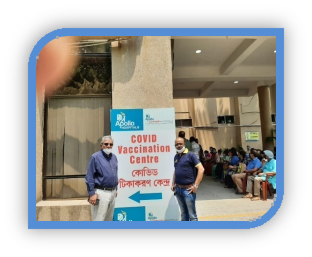
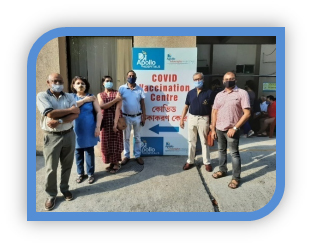
Moving back to the month under retrospect, April started on a positive note: Bro G N Singh had made arrangements with Apollo Gleneagles Hospital for vaccination of Masons and their families and friends without having to suffer the serpentine queues and interminable waits. Going to the extent of providing the facility free. Keeping in mind the age bracket, sixty and above, the measure was particularly propitious. On the 2nd, 3rd and 4th of the month. It bears recall that it was the Easter week, among the holiest in the year, — the remembrance of the Passion, Our Lord suffering vicariously, cleansing the world with His, shall-we-call, ichor. And the concurrent Passover, commemorating the deliverance of the Isrealites from their Egyptian bondage, to flip back to the other Testament. Not wholly unrelated to Freemasonry, considering the fraternity draws extensively from Hebrew history. Symbolic, if a sheer happenstance, – to borrow a trans-Atlantic portmanteau word, — the District endeavouring in its own humble way to cleanse the brethren of and liberate them from that spiked ball of evil. With Bro Thapar in the lead, Bros Singh, Subir Dutta, young Sandeep Mukherjee and the office staff, Hari Ojha, oversaw the arrangements at the hospital on all the three days. In peril of their own well-being.
Otherwise, the month did not provide much to write home about. While the meetings and convocations were held according to schedule, the imminent closure haunted all who hold 19 dear, worried the heavy teak door would be battened up again. The apprehensions turned apocalyptic on the last day of the month: Bro Thapar, after consultations with the senior officers of the District, suspended all Masonic activities in the face of the grim resurgence, the now clichéd with over-use second wave. Freemasons’ Hall has been shuttered down a second time.
While that iconic address remains off limits, Bro Anil Vaswani chooses to provide us with a much sought-after relief in a riveting tribute to Rudyard Kipling. Read on, dear brethren, to learn more about the distinguished Mason’s life and works.
Editor
FREEMASONRY IN LITERATURE: KIPLING AND THE MOTHER-LODGE
By Bro Anil Vaswani, PM, Lodge Kathmandu of Nepal
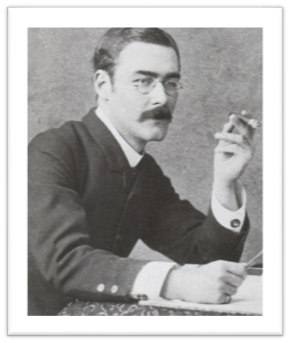
Back in 1981 when I was in Class 1, I received as a general proficiency prize a fascinating book called “Just So Stories” by Rudyard Kipling, which I instantly proceeded to devour from cover to cover several times over. That same volume, now dog-eared volume with crumbling spine and yellowing pages, still occupies a place of pride on my bookshelf today, and I continue to derive immense pleasure from reading those simply written yet surprisingly alluring stories to my own children when putting them to bed. Kipling thus unsuspectingly entered into my life at a tender age, and Freemasonry was later responsible for reconnecting me with the man in my adult life in a different yet indelibly fascinating way.
Although Rudyard Kipling is perhaps most famous for his short stories, he was just as famed for his verse as his prose, including such unforgettable poems as “If”, “The White Man’s Burden”, “The Ballad of East and West”, “Gunga Din”, and “Mandalay”. Many of his most famous poetic phrases, such as “East is East and West is West, and never the twain shall meet”, or “You’re a better man than I am, Gunga Din!” or ” If you can meet with Triumph and Disaster, and treat those two impostors just the same” have become catchphrases in the vocabulary of generations long after his passing.
One cannot help but notice, however, that Masonic behaviour and ideals appear interwoven in his prose as well as his poetry, not just implicitly as an undercurrent in the background, but often as the central theme of his stories, such as “The Man Who Would Be King”. Take for example this exchange between the protagonist (the author writing in first person) and Brother Peachey Carnehan, who invokes Masonic obligation while asking him to take a message to Brother Daniel Dravot:
“I ask you, as a stranger going to the West,” he said with emphasis.
“Where have you come from?” said I.
“From the East,” said he, “and I am hoping that you will give him the message on the Square for the sake of my Mother as well as your own.”
Born in Bombay in 1865, Joseph Rudyard Kipling joined Freemasonry at a very young age and was fervently dedicated to it for the rest of his life. He was Initiated into Hope and Perseverance Lodge No. 782 in Lahore in 1886, while he was still under the required age of 21. This might have been because the Lodge needed a new Secretary, and as young Rudyard was an upcoming newspaper writer he was considered ideal for the task. It was here that he received the three degrees of Craft Masonry, and also the side degrees of Mark Master Mason (in Fidelity Mark Lodge No. 98) and Royal Ark Mariner (in Mount Ararat Ark Mariners’ Lodge). Interestingly, the Lodge’s minutes recording Kipling’s Raising at Hope and Perseverance Lodge are written in his own hand, which means he was in the unique and unusual situation of acting as the Secretary at his own Raising.
The Hope and Perseverance Lodge No. 782 itself was founded in December 1858, just after the horrendous acts of the Great Indian Mutiny of 1857 had left the political climate of the subcontinent charged with mutual distrust and suspicion. One of its aims, therefore, was to “foster the bonds of Brotherly Love” between the Indians and the British. In Kipling’s own words: “I was Secretary for some years of the Lodge, which included Brethren of at least four creeds. I was Entered by a member from Brahmo Samaj, a Hindu, Passed by a Mohammedan, and Raised by an Englishman. Our Tyler was an Indian Jew.”
Despite his bright Masonic start, his association with his own Mother Lodge was short-lived as he was transferred to Allahabad in the autumn of 1887. Despite this, his affection for his Mother Lodge was such that he wrote to them requesting that he remain on their rolls as an Absent Brother.
Freemasonry would have a profound impact on Kipling, and several of his works took on Freemasonic themes; besides “The Mother-Lodge”, the most famous being his stories “Kim” and “The Man Who Would Be King”. It has been written of him: “There seems to have been some quality deep within his nature to which Freemasonry appealed. The idea of a secret bond, of a sense of community, and of high principles among men sworn to a common purpose, fitted his concept of a social order.”
Kipling’s love with Masonry continued even after leaving Lahore — he was also an honorary member of the Author’s Lodge and Motherland Lodge in England and became a founding member of The Builders of the Silent Cities Lodge No. 12 at St Omer, France. He was elected an Honorary Member of Hope and Perseverance in 1935, just a while before he breathed his last. In recognition of this lifelong attachment and love for his Mother Lodge, the Hope and Perseverance Lodge No. 782 was bestowed with the subsidiary title of “The Kipling’s Lodge” in December 1936, eleven months after his death.
His simple but powerful Masonic poem “The Mother-Lodge” deals with the themes of brotherhood, loyalty, unity between races and classes, and memory. The men care little for the colour of each others’ skin or their religions, and their importance does not come from their uniforms or the appearance of their Lodge, but from their strength of character and their value of friendship and honour, regardless of where they end up later in the world. The words drive home the sense of camaraderie, open-mindedness and intimacy that comes from sharing deep thoughts and feelings with people you care about in a comfortable environment. Would that we as Masons continue to draw inspiration from this work, the message of which is as meaningful and relevant today in 2021 as when it was first composed in 1896.
THE MOTHER-LODGE
There was Rundle, Station Master,
An’ Beazeley of the Rail,
An’ ‘Ackman, Commissariat,
An’ Donkin’ o’ the Jail;
An’ Blake, Conductor-Sargent,
Our Master twice was ‘e,
With ‘im that kept the Europe-shop,
Old Framjee Eduljee.
Outside — “Sergeant! Sir! Salute! Salaam!”
Inside — “Brother”, an’ it doesn’t do no ‘arm.
We met upon the Level an’ we parted on the Square,
An’ I was Junior Deacon in my Mother-Lodge out there!
We’d Bola Nath, Accountant,
An’ Saul the Aden Jew,
An’ Din Mohammed, draughtsman
Of the Survey Office too;
There was Babu Chuckerbutty,
An’ Amir Singh the Sikh,
An’ Castro from the fittin’-sheds,
The Roman Catholick!
We ‘adn’t good regalia,
An’ our Lodge was old an’ bare,
But we knew the Ancient Landmarks,
An’ we kep’ ’em to a hair;
An’ lookin’ on it backwards
It often strikes me thus,
There ain’t such things as infidels,
Excep’, per’aps, it’s us.
For monthly, after Labour,
We’d all sit down and smoke
(We dursn’t give no banquits,
Lest a Brother’s caste were broke),
An’ man on man got talkin’
Religion an’ the rest,
An’ every man comparin’
Of the God ‘e knew the best.
So man on man got talkin’,
An’ not a Brother stirred
Till mornin’ waked the parrots
An’ that dam’ brain-fever-bird;
We’d say ’twas ‘ighly curious,
An’ we’d all ride ‘ome to bed,
With Mo’ammed, God, an’ Shiva
Changin’ pickets in our ‘ead.
Full oft on Guv’ment service
This rovin’ foot ‘ath pressed,
An’ bore fraternal greetin’s
To the Lodges east an’ west,
Accordin’ as commanded
From Kohat to Singapore,
But I wish that I might see them
In my Mother-Lodge once more!
I wish that I might see them,
My Brethren black an’ brown,
With the trichies smellin’ pleasant
An’ the hog-darn passin’ down;
An’ the old khansamah snorin’
On the bottle-khana floor,
Like a Master in good standing
With my Mother-Lodge once more!
Outside — “Sergeant! Sir! Salute! Salaam!”
Inside — “Brother”, an’ it doesn’t do no ‘arm.
We met upon the Level an’ we parted on the Square,
An’ I was Junior Deacon in my Mother-Lodge out there!
********************************
EDITOR: Amit Dutt
Mobile: +91 98312 23230, E-mail : a_k_dutt_06@yahoo.com
DISTRICT GRAND SECRETARY: Gyanendra Narain Singh
Mobile: +919230613338, 9903033599, E-mail : dgsofbengalfm@gmail.com
Freemasons’ Hall, 19, Park Street, Kolkata – 700 016, West Bengal, India.